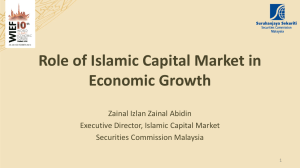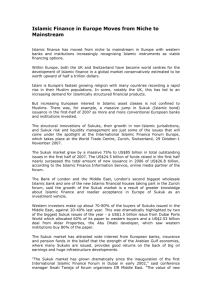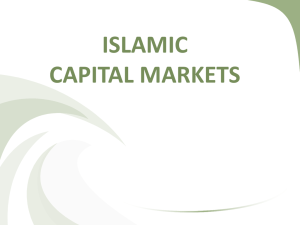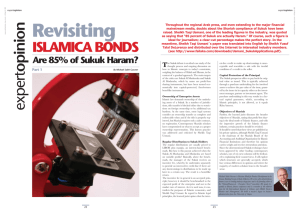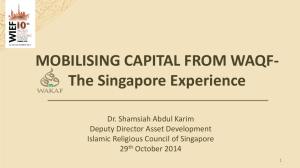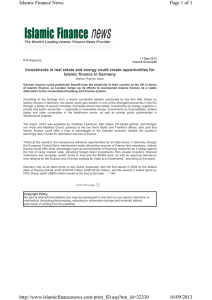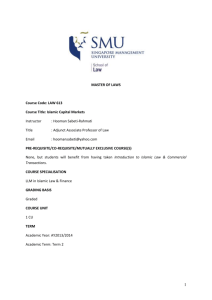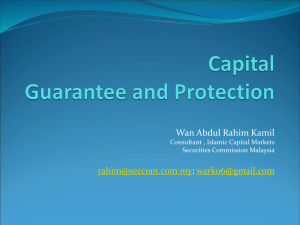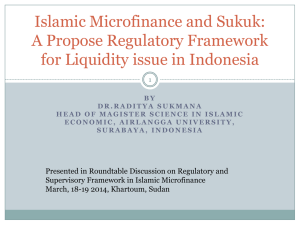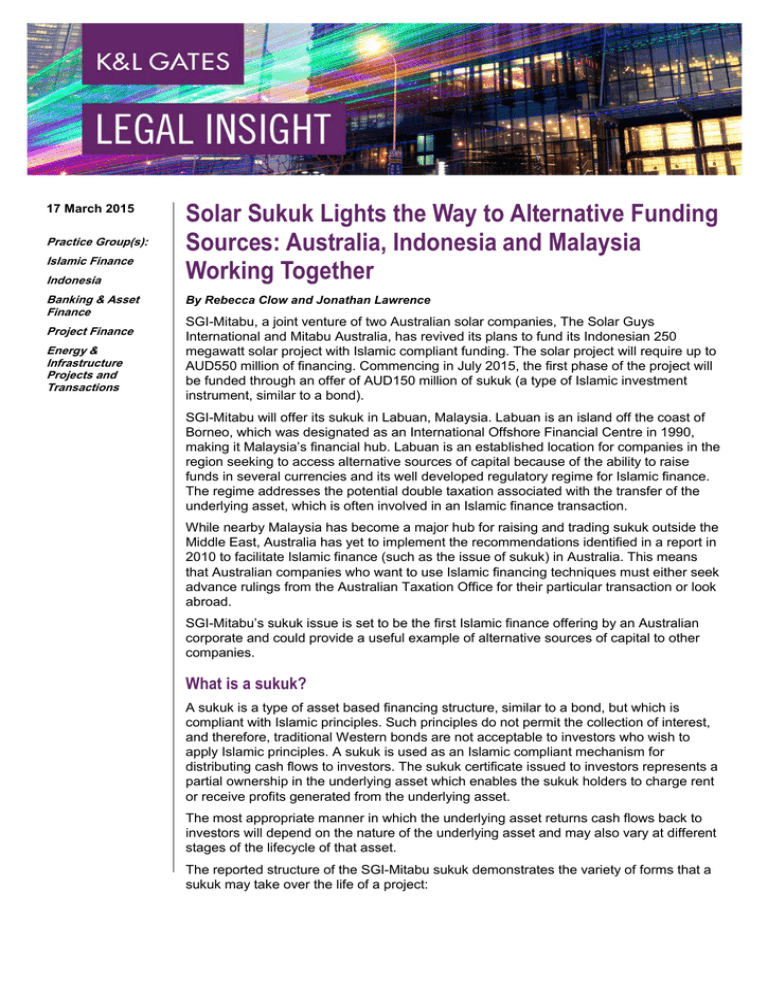
17 March 2015
Practice Group(s):
Islamic Finance
Indonesia
Banking & Asset
Finance
Project Finance
Energy &
Infrastructure
Projects and
Transactions
Solar Sukuk Lights the Way to Alternative Funding
Sources: Australia, Indonesia and Malaysia
Working Together
By Rebecca Clow and Jonathan Lawrence
SGI-Mitabu, a joint venture of two Australian solar companies, The Solar Guys
International and Mitabu Australia, has revived its plans to fund its Indonesian 250
megawatt solar project with Islamic compliant funding. The solar project will require up to
AUD550 million of financing. Commencing in July 2015, the first phase of the project will
be funded through an offer of AUD150 million of sukuk (a type of Islamic investment
instrument, similar to a bond).
SGI-Mitabu will offer its sukuk in Labuan, Malaysia. Labuan is an island off the coast of
Borneo, which was designated as an International Offshore Financial Centre in 1990,
making it Malaysia’s financial hub. Labuan is an established location for companies in the
region seeking to access alternative sources of capital because of the ability to raise
funds in several currencies and its well developed regulatory regime for Islamic finance.
The regime addresses the potential double taxation associated with the transfer of the
underlying asset, which is often involved in an Islamic finance transaction.
While nearby Malaysia has become a major hub for raising and trading sukuk outside the
Middle East, Australia has yet to implement the recommendations identified in a report in
2010 to facilitate Islamic finance (such as the issue of sukuk) in Australia. This means
that Australian companies who want to use Islamic financing techniques must either seek
advance rulings from the Australian Taxation Office for their particular transaction or look
abroad.
SGI-Mitabu’s sukuk issue is set to be the first Islamic finance offering by an Australian
corporate and could provide a useful example of alternative sources of capital to other
companies.
What is a sukuk?
A sukuk is a type of asset based financing structure, similar to a bond, but which is
compliant with Islamic principles. Such principles do not permit the collection of interest,
and therefore, traditional Western bonds are not acceptable to investors who wish to
apply Islamic principles. A sukuk is used as an Islamic compliant mechanism for
distributing cash flows to investors. The sukuk certificate issued to investors represents a
partial ownership in the underlying asset which enables the sukuk holders to charge rent
or receive profits generated from the underlying asset.
The most appropriate manner in which the underlying asset returns cash flows back to
investors will depend on the nature of the underlying asset and may also vary at different
stages of the lifecycle of that asset.
The reported structure of the SGI-Mitabu sukuk demonstrates the variety of forms that a
sukuk may take over the life of a project:
Solar Sukuk Lights the Way to Alternative Funding
Sources: Australia, Indonesia and Malaysia Working
Together
• Construction phase - Istisna Sukuk
An istisna sukuk distributes cash flow like a fixed price manufacturing contract for
goods. In this case, the sukuk certificate holders are in a position similar to the
purchaser of goods that will, after payment, be manufactured and delivered on a
stipulated date. On its own, an istisna sukuk does not generate returns for the
certificate holders during construction. However, depending on the length of the
construction period, this type of arrangement may be combined with a forward leasing
arrangement to generate returns during construction. In this regard, solar panel
projects, such as SGI-Mitabu’s Indonesian project, have an advantage due to their
rapid installation phase. This means that income streams can start within a few
months without utilising forward leasing arrangements.
• First 20 years from completion - Ijara Sukuk
An ijara sukuk distributes cash flow like a lease agreement would. Under an ijara
sukuk a sukuk certificate entitles the sukuk holders to a proportionate share of the
returns generated by the underlying asset by way of a lease back to the issuer
company. Generally, under an ijara sukuk, the lease payments will match the periodic
payments due to the sukuk holders under the certificates.
• 20 years onwards - Musharaka Sukuk
A musharaka sukuk distributes cash flow like a limited partnership. In this case, the
sukuk certificate entitles the holder to returns from the underlying enterprise that are
distributed between the issuer and certificate holders in accordance with a profit
sharing ratio. The ratio is normally based on the initial capital contribution of each
partner.
Which projects are suitable for sukuk funding?
The sukuk mechanism is most suited to fundraising on income producing assets as this
enables the assets to be sold during the life of the transaction. If an asset were not
income producing, the originator would have to be prepared to lock up the investment for
the life of the sukuk.
When considering whether Islamic financing is suitable for a project, the nature of the
business activity also has to be considered to determine whether it is eligible for
investment. This is because certain industries do not comply with Islamic principles of
business (such as alcohol, gambling and pork).
There is no restriction on the location of a project that is funded via a sukuk under Islamic
investment principals. However, a sukuk fundraising needs to be offered in an Islamic
finance friendly tax jurisdiction (due to the transfers of title of the underlying asset that are
normally involved).
Generally sukuk can be purchased by domestic or foreign investors to the country of
issue. In this case, the entire issue by SGI-Mitabu is expected to be placed with
Malaysian investors.
There are a number of regulatory barriers to the development of an Australian Islamic
finance industry. These issues were identified in a 2010 report by the Australian Board of
Taxation and are still yet to be implemented by the Australian government. In particular,
the Australian regulatory environment is not presently considered “sukuk friendly” from a
tax perspective. While in some cases it may be possible to obtain advanced rulings from
the Australian Taxation Office for certain Islamic financing techniques, Australian
companies wishing to access Islamic financing may also wish to consider looking
2
Solar Sukuk Lights the Way to Alternative Funding
Sources: Australia, Indonesia and Malaysia Working
Together
overseas, particularly to Labuan, Malaysia which has become a regional hub in which
funds can be raised in Australian dollars, avoiding the swap costs associated with raising
funds abroad.
A sukuk offering is suitable for fundraising by way of a public offering or a private
placement. Further, in the case of ijara or musharaka sukuk, these can also be listed and
traded on a stock exchange.
Conclusion
Accessing the sukuk market may be advantageous for companies seeking to raise funds
as demand for Islamic-compliant investments like sukuk tends to outstrip supply.
Companies seeking alternative sources of funding, particularly those that are active in
Indonesia, Malaysia and the Gulf States, may wish to consider whether a form of Islamic
finance would be suitable for their next project – even if they have to look outside their
own jurisdiction to make it happen.
Authors:
Rebecca Clow
Rebecca.Clow@klgates.com
+44.20.7360.8221
Jonathan Lawrence
Jonathan.Lawrence@klgates.com
+44.20.7360.8242
Anchorage Austin Beijing Berlin Boston Brisbane Brussels Charleston Charlotte Chicago Dallas Doha Dubai Fort Worth Frankfurt
Harrisburg Hong Kong Houston London Los Angeles Melbourne Miami Milan Moscow Newark New York Orange County Palo Alto
Paris Perth Pittsburgh Portland Raleigh Research Triangle Park San Francisco São Paulo Seattle Seoul Shanghai Singapore
Spokane Sydney Taipei Tokyo Warsaw Washington, D.C. Wilmington
K&L Gates comprises more than 2,000 lawyers globally who practice in fully integrated offices located on five
continents. The firm represents leading multinational corporations, growth and middle-market companies,
capital markets participants and entrepreneurs in every major industry group as well as public sector entities,
educational institutions, philanthropic organizations and individuals. For more information about K&L Gates or
its locations, practices and registrations, visit www.klgates.com.
This publication is for informational purposes and does not contain or convey legal advice. The information herein should not be used or relied upon
in regard to any particular facts or circumstances without first consulting a lawyer.
© 2015 K&L Gates LLP. All Rights Reserved.
3

